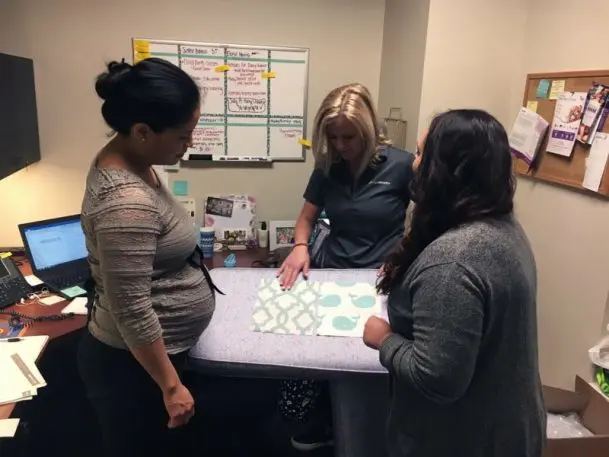Charnella Grossman is a vice president and senior portfolio manager in Fifth Third Bank’s investment advisory group. She’s also a mother of a 1-year old and is currently 38 weeks pregnant with her second child. Grossman is planning to take full advantage of Fifth Third Bank’s paid leave policy (four weeks for both moms and dads who have a new baby, adopt, or foster a child in addition to six weeks of medical leave for women after they give birth) when her baby is born. But she’s also using another benefit right now that’s relatively new to her employer.
For the last several months, Grossman’s been using Fifth Third Bank’s Maternity Concierge for “everything that isn’t work related.” She ticks off tasks like picking up dry cleaning and helping her replace broken heels to organizing the new nursery. “They helped me order my breast pump that I’ll use [when I return to work],” she adds, all so she can focus on her job while she’s in the office.
That’s exactly why Maternity Concierge was started in late January and then rolled out as a virtual concierge for employees of the bank’s locations across 10 states. Fifth Third’s chief administrative officer, Teresa Tanner, says that she took note of how many women she spoke to reached a career pivot point when they began planning to start a family. Tanner says that while benefits like flex time, part time, and job sharing can help, “There’s a big cost to that, you still delay your career or slow it down.”

A recent Kauffman report reveals a broader trend. Since 2000, women’s labor force participation has actually stagnated despite Census data showing women now hold more bachelor’s degrees than men. This is due in part to the astronomical cost of childcare, especially for parents of multiple children, making it more cost effective for one parent to stay home–and thanks to the gender wage gap, that person is often the mom.
So the question became how to keep women from opting out if they don’t want to. Tanner suggested a different approach to juggling the demands of work and life to help those who want to stay on a full-time career path.
As companies continue boosting their paid leave offerings to entice talent, as well as provide benefits like egg freezing or shipping breast milk, Fifth Third Bank hit on a partnership with women-owned concierge service Best Upon Request. The bank has offered similar concierge services for all employees in their Cincinnati office for several years, so it didn’t take long to build out this additional free offering for mothers to use before, during, and after their pregnancy in the months after they return to work.

Although Tanner asserts, “They won’t transport children or pets,” there’s hardly anything else the concierges won’t do. Requests have ranged from planning gluten-free gender reveal parties to scouring Pinterest and pinning images that could inspire a child’s birthday party theme, she says.
All of this “unpaid work” adds up as a cost to women’s careers and to the U.S. economy. A recent survey by the McKinsey Global Institute (MGI) found that women do double the amount of unpaid care work that men do. Taking care of children, loved ones, or the elderly makes up only 20% of unpaid care work. The rest: shopping, cooking, cleaning, and the like fill up the rest. The report notes that this work is counted as GDP, “but it could be valued, using conservative assumptions based on available data on minimum wages, at an estimated $1.5 trillion a year.”

Tanner has organized a monthly scrum team to evaluate what’s going well or not and plans to add services like the shipping of breastmilk when women are traveling. Overall, she observes, “It is a relatively small percentage of our [benefits] budget,” but says it has a significant impact.
Even though broad retention metrics aren’t yet available, Fifth Third expects to have reliable data at the one-year mark when several women will have used it throughout their pregnancy and during their child’s first year.
As for Grossman, she says she’s more productive now that she can concentrate on work she’s being paid to do, without worrying about managing everything else. “It serves as a show of commitment to women in the workplace,” she adds “and signals that management is committed to investing in employees.”
Recognize your brand’s excellence by applying to this year’s Brands That Matter Awards before the early-rate deadline, May 3.
